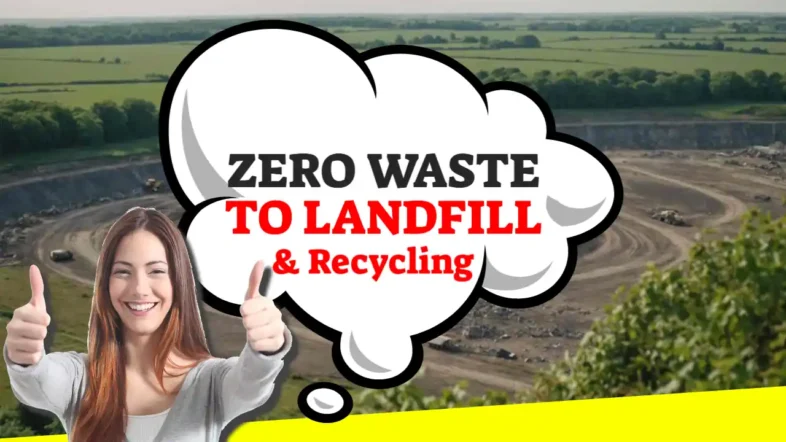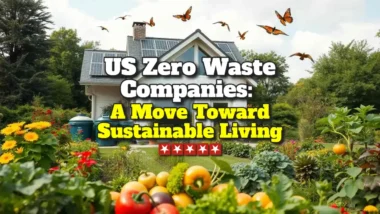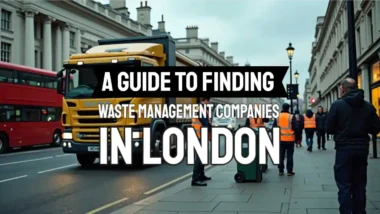Zero Waste in its literal interpretation is a fabulous idea (as is even the lesser target of “zero waste to landfill”), but not so easy to achieve. Untold billions are being spent by governments worldwide to increase recycling and reduce the amount of waste which ends up in landfills and good progress has been achieved in many nations.
So, as global waste generation continues to rise, the concept of Zero Waste emerges as a beacon of hope for environmental sustainability. It’s not just a trend; it’s a transformative movement that invites individuals, businesses, and governments to rethink their approach to consumption and waste management.
What You Will Learn
- Zero Waste is a philosophy aimed at preventing waste creation by redesigning resource life cycles, significantly impacting environmental sustainability.
- The definition of Zero Waste varies globally, reflecting cultural, economic, and environmental contexts, emphasizing community involvement and education.
- Current global waste management statistics show a recycling rate of approximately 30%, with some cities achieving landfill diversion rates over 70%.
- Successful case studies, such as those from Capel Manor College and Kamikatsu, demonstrate practical approaches to achieving Zero Waste and inspire other communities.
- Government policies, such as the UK’s Waste and Resources Strategy, play a crucial role in fostering Zero Waste initiatives through clear frameworks and collaboration.
- Economic barriers and the need for behavioral change present significant challenges in achieving Zero Waste, necessitating education and community engagement.
- Long-term waste reduction goals for 2025 and 2050 include reducing landfill waste by 50% and aiming for a fully circular economy by 2050.
- Innovative technologies, such as Waste-to-Energy systems and smart bins, are essential for enhancing waste management efficiency and effectiveness.
- Community initiatives, including gardens and repair cafés, foster local zero waste practices and promote sustainability at grassroots levels.
- Continuous advocacy and regular assessments are vital for tracking progress towards Zero Waste goals and adapting strategies for success.
Understanding Zero Waste Initiatives and Their Global Impact
The Concept of Zero Waste: A Comprehensive Overview
Defining Zero Waste and Its Significance in Environmental Sustainability
The term Zero Waste refers to a philosophy aiming to prevent waste from being created in the first place. It encourages the redesign of resource life cycles so that all products are reused and nothing is sent to landfills or incinerators. This approach is crucial for environmental sustainability as it reduces pollution, conserves resources, and minimizes greenhouse gas emissions.
By focusing on reduction, reuse, and recycling, Zero Waste initiatives contribute to a healthier planet. Understanding the significance of this concept helps us realize that small changes can lead to big impacts. Communities and individuals can make choices that collectively lead to a cleaner and more sustainable future.
The Evolution of Zero Waste Definitions Across Nations
Over the years, the definition of Zero Waste has evolved significantly across different countries. Initially, it was largely focused on recycling, but now it encompasses a broader range of practices. In some regions, Zero Waste policies emphasize community involvement and education as key components.
For example, in places like New Zealand and Canada, Zero Waste is seen as a framework for encouraging sustainable practices at both local and national levels. Different definitions reflect varying cultural, economic, and environmental contexts, showing that there isn’t a one-size-fits-all approach to achieving Zero Waste.
Current State of Waste Management: Trends and Progress
Key Statistics on Waste Diversion from Landfills
Today, many countries are working hard to divert waste from landfills. Here are some key statistics that show the current state of waste management:
- The global recycling rate is approximately 30%.
- In the EU, about 50% of municipal waste is recycled.
- Landfill diversion rates in some cities have surpassed 70%.
These numbers indicate progress, but there’s still much work to be done. Understanding these statistics helps in identifying areas for improvement. It's essential to keep pushing for better waste management practices.
Case Studies: Success Stories from the UK and Beyond
Let’s take a look at some inspiring examples of Zero Waste initiatives:
- Capel Manor College in the UK has implemented a successful composting program, diverting significant amounts of food waste.
- Kamikatsu, a town in Japan, has a detailed waste separation system leading to over 80% waste diversion.
- San Francisco aims for a Zero Waste goal by 2030, using comprehensive recycling and composting to reduce landfill waste.
These case studies highlight that practical approaches can lead to measurable results. They also inspire others by showing that a commitment to Zero Waste can truly make a difference. Communities can learn from these successes and adapt similar strategies.
Government Policies and Their Role in Promoting Zero Waste
Analysis of Strategic Documents Issued by UK Governments
Government policies play a vital role in supporting Zero Waste initiatives. The UK government has released several strategic documents that lay out plans and frameworks aimed at reducing waste. Key documents include:
- The Waste and Resources Strategy focuses on reducing waste and boosting recycling efforts.
- Environmental policies encourage local authorities to set ambitious waste reduction targets.
- Guidelines for businesses promote sustainable practices and waste prevention techniques.
These documents guide local actions and policies and set the tone for a national commitment to sustainability. They also reflect the importance of collaboration between governments, communities, and businesses. Effective policy frameworks can drive significant change.
The Role of Local Authorities in Achieving Zero Waste Goals
Local authorities are key players in the journey towards Zero Waste. They implement policies and programs that encourage community engagement and waste reduction. Here are some ways they contribute:
- Providing recycling education and resources for residents.
- Implementing curbside composting programs.
- Offering incentives for businesses to adopt sustainable practices.
The actions of local authorities can create a strong foundation for Zero Waste initiatives. By fostering community involvement, they can help people understand their impact on waste management. Greater awareness leads to more effective waste prevention strategies.
Challenges in Achieving Zero Waste Targets
Economic Barriers and the Impact on Landfill Operations
While many strive for Zero Waste, challenges remain. Economic barriers can hinder the effectiveness of waste management systems. For instance, operating landfills is expensive, and reducing waste often requires initial investments.
Moreover, the costs of recycling can be high, making it difficult for businesses to shift to sustainable practices. These economic factors often lead to resistance against adopting Zero Waste strategies. Ultimately, overcoming these barriers is crucial for making substantial progress toward waste reduction.
Behavioral Changes Required for Effective Waste Management
Another significant challenge is the need for widespread behavioral change. People often continue to follow habits that lead to waste generation. To make Zero Waste successful, we must encourage:
- Mindful consumption of goods.
- Active participation in recycling programs.
- Adoption of reusable products instead of single-use items.
These changes require education and awareness, and they often take time. Encouraging individuals and communities to shift their mindset is essential for improving waste management efforts. With consistent messaging and support, we can make these changes happen.
Long-Term Goals and Pragmatic Approaches to Zero Waste
Understanding the 2025 and 2050 Targets for Waste Reduction
Looking into the future, many organizations and governments have set long-term targets for waste reduction. The goals for 2025 and 2050 often include:
- Reducing landfill waste by 50% by 2025.
- Aiming for a fully circular economy by 2050.
- Increasing recycling rates to over 65% by 2030.
These targets are ambitious, but they reflect a growing commitment to tackling waste issues. They guide the development of policies and initiatives aimed at achieving a sustainable future. Understanding these goals helps to inspire collective action.
Transitioning from Ambitious Ideals to Realistic Action Plans
Transitioning to Zero Waste requires practical action plans that align with ambitious ideals. Here are some steps to consider:
- Establishing clear benchmarks for waste reduction.
- Involving communities in the planning process.
- Monitoring progress and adjusting strategies as needed.
By focusing on achievable actions, we can create a path toward Zero Waste. This transition fosters collaboration and encourages local ownership of waste management efforts. It’s an essential part of making Zero Waste a reality.
Engagement Strategies for Consumers and Businesses
Encouraging Sustainable Consumer Behavior for Waste Prevention
For Zero Waste initiatives to succeed, both consumers and businesses must get involved. Here are strategies that can help:
- Promoting the benefits of reducing plastics.
- Encouraging participation in local recycling programs.
- Supporting businesses that adopt sustainable practices.
By raising awareness about sustainable options, we can motivate consumers to change their habits. This shift is vital for reducing overall waste and promoting a cleaner environment. Empowering individuals leads to stronger community action.
How Businesses Can Contribute to a Zero Waste Economy
Businesses play a crucial role in driving the Zero Waste movement forward. Here are ways they can contribute:
- Implementing waste audits to identify reduction opportunities.
- Designing products for durability, repairability, and recyclability.
- Engaging employees in sustainability initiatives.
Through these efforts, businesses can not only reduce their waste but also inspire others to follow suit. This collaborative approach creates a ripple effect that can lead to significant improvements. Together, we can work towards a thriving, Zero Waste economy.
Envisioning a Sustainable Future: What Lies Ahead for Zero Waste
Innovative Solutions and Technologies in Waste Management
The Role of Recycling and Composting in a Circular Economy
Recycling and composting are essential parts of a circular economy. They help keep materials in use for as long as possible, reducing overall waste. Here’s how they contribute:
- Recycling: Turns waste materials into new products, thereby conserving natural resources.
- Composting: Converts organic waste into nutrient-rich soil, perfect for gardening.
- Resource Recovery: Ensures that valuable materials are not lost and can be reused.
Emerging Technologies for Effective Waste Reduction
As we move towards a more sustainable future, technology plays a crucial role. Some new technologies making waves in waste management include:
- Waste-to-Energy Systems: Convert non-recyclable waste into usable energy.
- Smart Bins: Equipped with sensors to monitor waste levels and optimize collection routes.
- Advanced Sorting Technology: Uses AI to improve recycling efficiency by sorting materials more accurately.
Collaborative Efforts: Building a Community for Zero Waste
Importance of Partnerships Between Governments and Organizations
Collaboration is key to achieving zero waste goals. Partnerships can enhance efforts in various ways:
- Policy Development: Joint initiatives can create effective waste management policies.
- Resource Sharing: Organizations can pool resources to amplify their impact.
- Public Awareness: Collaborative campaigns can educate communities about zero waste practices.
Community Initiatives to Foster Local Zero Waste Practices
Local communities play a vital role in implementing zero waste strategies. Here are some initiatives they can adopt:
- Community Gardens: Promote composting and growing food sustainably.
- Repair Cafés: Encourage repairing items instead of discarding them.
- Zero Waste Events: Host events focused on reducing waste, like clean-up days.
Final Thoughts on Achieving Zero Waste Goals
Assessing Progress and Setting Future Milestones
To ensure we are on the right track toward zero waste, regular assessments are crucial. Here are steps to take:
- Set Clear Goals: Establish specific, measurable waste reduction targets.
- Track Progress: Regularly measure waste diversion rates to see what's working.
- Adapt Strategies: Be willing to change methods based on results.
Encouraging Continued Advocacy for Sustainable Waste Management Practices
Lasting change requires ongoing advocacy. Here are ways to keep the momentum going:
- Engage Communities: Encourage participation in sustainability programs.
- Educate: Share knowledge about the importance of zero waste.
- Promote Policies: Push for legislation that supports sustainable waste practices.








